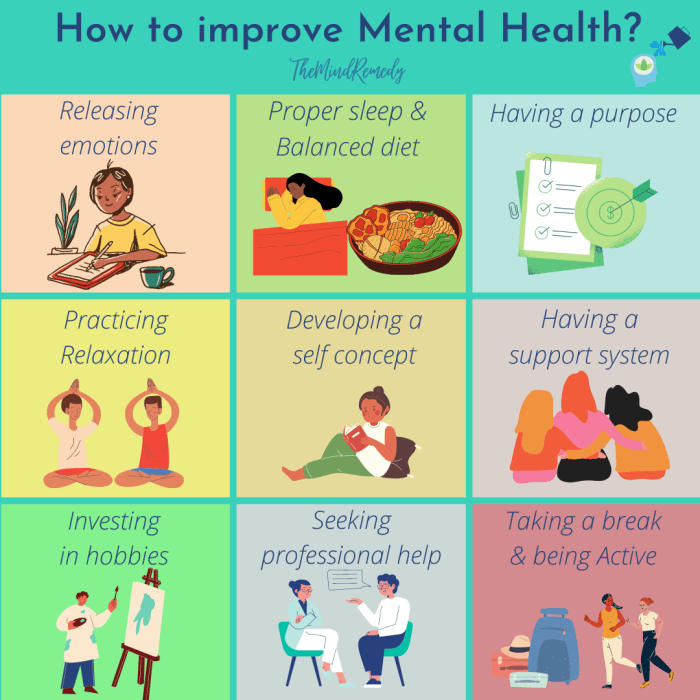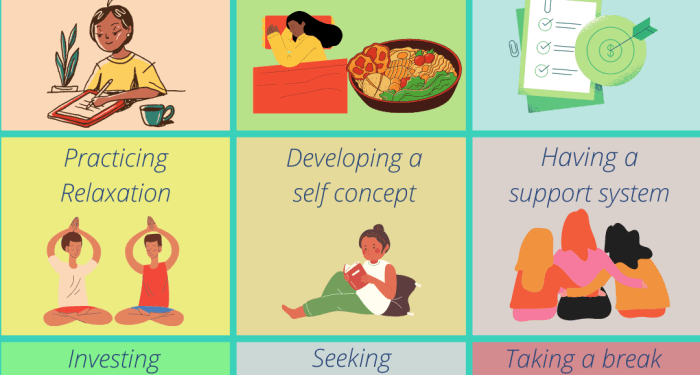Exploring the realm of natural mental health improvement, this introduction sets the stage for an enlightening journey. From understanding the significance of mental health to exploring lifestyle changes and stress management techniques, this guide offers valuable insights for enhancing overall well-being.
As we delve deeper into the various aspects of mental health enhancement, readers will discover practical tips and strategies to cultivate a healthier mind and body.
Understanding Mental Health
Mental health refers to our emotional, psychological, and social well-being. It is essential for how we think, feel, and act as individuals. Maintaining good mental health is crucial for coping with stress, making decisions, and forming relationships.
Importance of Mental Health
Mental health is vital as it affects every aspect of our lives. It impacts how we handle stress, relate to others, and make choices. Good mental health contributes to our overall well-being and quality of life.
Difference Between Mental Health and Mental Illness
Mental health refers to the state of our emotional well-being, while mental illness involves conditions that affect a person's thinking, feeling, behavior, or mood. Not everyone with a mental health condition will have a mental illness, and vice versa.
Impact of Mental Health on Overall Well-being
Positive mental health can enhance our resilience, improve our relationships, and increase our productivity. On the other hand, poor mental health can lead to difficulties in functioning, increased stress, and impaired decision-making abilities.
Factors Affecting Mental Health
- Positive Factors:
- Strong support system from family and friends
- Regular physical activity
- Healthy diet
- Effective stress management techniques
- Negative Factors:
- Loneliness and social isolation
- Unhealthy coping mechanisms like substance abuse
- Chronic stress
- Genetic predisposition to mental health disorders
Lifestyle Changes for Mental Health Improvement
Improving mental health through lifestyle changes is essential for overall well-being. By incorporating healthy habits into your daily routine, you can positively impact your mental state and emotional resilience.
Daily Habits for Better Mental Health
- Avoid overconsumption of caffeine and alcohol, as they can exacerbate anxiety and mood swings.
- Practice mindfulness and meditation to reduce stress and increase self-awareness.
- Engage in activities you enjoy, such as hobbies or spending time with loved ones, to boost your mood.
Importance of Regular Physical Activity
Regular exercise has been shown to have numerous benefits for mental health. It can help reduce symptoms of depression and anxiety, improve cognitive function, and enhance overall mood.
Role of Nutrition in Mental Health
- Include a variety of fruits, vegetables, whole grains, and lean proteins in your diet to support brain health.
- Avoid processed foods and sugar, as they can negatively impact mood and energy levels.
- Stay hydrated by drinking plenty of water throughout the day to maintain optimal brain function.
Tips for Quality Sleep
Quality sleep is crucial for mental well-being. Follow these tips to improve your sleep hygiene:
- Establish a consistent bedtime routine to signal your body that it's time to wind down.
- Avoid screens and stimulating activities before bed to promote relaxation.
- Create a comfortable sleep environment with a supportive mattress and cool, dark room.
Stress Management Techniques
Managing stress is crucial for maintaining good mental health. There are various techniques that can help individuals cope with stress and improve their overall well-being.
Benefits of Mindfulness and Meditation
- Practicing mindfulness involves being present in the moment and fully aware of your thoughts and feelings. This can help reduce stress, anxiety, and depression.
- Meditation techniques, such as deep breathing and guided meditation, can promote relaxation and calm the mind, leading to better mental clarity and emotional stability.
- Regular mindfulness and meditation practices have been shown to improve focus, reduce rumination, and enhance self-awareness.
Impact of Journaling or Expressive Writing
- Journaling or expressive writing allows individuals to explore their emotions, thoughts, and experiences in a safe and private space. This can help process difficult emotions and identify stress triggers.
- Expressing thoughts and feelings through writing can provide a sense of relief and clarity, leading to reduced stress levels and improved mental well-being.
- Keeping a gratitude journal can also help shift focus towards positive aspects of life, promoting a more optimistic outlook and reducing stress.
Relaxation Techniques
- Deep breathing exercises, such as diaphragmatic breathing or box breathing, can help calm the nervous system and reduce stress levels quickly.
- Progressive muscle relaxation involves tensing and relaxing different muscle groups in the body, promoting physical and mental relaxation.
- Practicing relaxation techniques regularly can help individuals manage stress more effectively and improve their overall mental health.
Building Supportive Relationships
Building supportive relationships plays a crucial role in maintaining good mental health. Social connections have a significant impact on our overall well-being, influencing our mood, stress levels, and sense of belonging.
Setting Boundaries in Relationships
Setting boundaries is essential for mental well-being. It helps establish healthy and respectful relationships, ensuring that your needs are met while maintaining a sense of self. Here are some tips on how to set boundaries effectively:
- Communicate openly and honestly about your needs and limits.
- Be assertive in expressing your boundaries, even if it may be uncomfortable.
- Respect other people's boundaries and communicate mutual expectations.
- Take time for self-care and prioritize your mental health.
Fostering Healthy Relationships and Seeking Support
Fostering healthy relationships involves mutual respect, trust, and communication. It is important to surround yourself with people who uplift and support you. Here are some tips on how to foster healthy relationships and seek support when needed:
- Build trust through open and honest communication.
- Show empathy and understanding towards others.
- Schedule regular check-ins with friends and loved ones.
- Seek professional help if you are struggling with your mental health.
Impact of Loneliness on Mental Health and Ways to Combat It
Loneliness can have a detrimental effect on mental health, leading to feelings of isolation and depression. It is crucial to combat loneliness by:
- Engaging in social activities and joining clubs or groups with shared interests.
- Reaching out to friends and family for support and companionship.
- Volunteering or helping others in need to foster connections and a sense of purpose.
- Practicing self-care activities that promote self-love and self-compassion.
Conclusive Thoughts

In conclusion, this guide has shed light on the importance of prioritizing mental health and offered actionable steps for natural improvement. By incorporating these strategies into daily life, individuals can embark on a journey towards enhanced well-being and emotional balance.
FAQ Overview
How can I improve my mental health naturally?
To improve mental health naturally, focus on regular exercise, a balanced diet, quality sleep, stress management techniques, and building supportive relationships.
What role does nutrition play in mental health improvement?
Nutrition plays a crucial role in mental health as certain nutrients can impact mood regulation and cognitive function. Consuming a diet rich in fruits, vegetables, whole grains, and lean proteins can support mental well-being.
How important are social connections for mental health?
Social connections are vital for mental health as they provide emotional support, reduce feelings of isolation, and contribute to a sense of belonging. Cultivating healthy relationships can significantly improve mental well-being.
What are some effective stress management strategies?
Effective stress management strategies include mindfulness practices, meditation, deep breathing exercises, and journaling. These techniques can help reduce stress levels and promote mental clarity.














